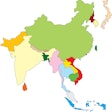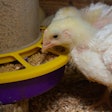
Following a recent spike in egg and chicken meat prices, the government of Bangladesh is examining a range of measures to keep these key food products affordable for the population and stabilize the poultry industry.
Within a period of just one month, egg and broiler chicken prices have risen by 12.5%, putting further pressure on the budgets of low- and middle-income families in Bangladesh.
Last week, The Business Standard reported that the market price for a dozen eggs was approaching 180 Bangladeshi taka (BDT; US$1.64) following the dramatic price rise.
In order to contain prices, the Ministry of Animal Resources has declared that the cost of production on farms must not exceed BDT10.50 per egg. Furthermore, it announced, the retail price should not be higher than BDT12.00.
The source reports that market prices fell slightly in response to these announcements.
Results of a previous analysis pointed to a clear link between the price of poultry products and feed costs. As a result, the Ministry of Commerce is reported to be examining means of supporting the Bangladeshi poultry feed sector, as well as identifying the market forces behind the recent price rises. Furthermore, it is considering raising egg imports.
Poultry products are not the only staples to be affected by recent food price inflation in the country. According to The Business Standard, the ministry is also looking into other commodities, such as potatoes, onions, garlic, and salt.
Poultry producers propose solutions
An earlier report in Business Post describes Bangladesh’s poultry industry as being in an unstable situation.
With the aims to return the sector to a more stable footing as well as to reduce production costs, the national poultry association has put forward a series of recommendations.
Among the proposals put forward by the Bangladesh Poultry Industries Central Council (BPICC) are the easing of Letter of Credit facilities for poultry business financing. They are also calling for greater flexibility and less bureaucracy for the importation of both egg and poultry products and feed ingredients. For example, they are the BPICC wants import duties to be dropped for alternative feedstuffs such as sunflower meal, millet, and groundnuts.
With a view to greater self-sufficiency and lower feed costs, the government should be encouraging domestic production of corn (maize), soybeans, and other potential feed crops, BPICC says.
Last but not least, the Council said that the government should in future adjust the official prices for eggs and chicken meat in Bangladesh every month.
Multifactorial challenges
A range of explanations for the recent rise in poultry prices in Bangladesh were reported by Business Post.
For BPICC president Shamsul Arefin Khaled, it is the nation’s traders who have made unfair profits. He said that most poultry farmers made losses in 2022 and 2023.
Prices of eggs and poultry products are subject simply to market forces of supply and demand, according to Kazi Zahin, president of the Breeders Association of Bangladesh.
In contrast, general secretary of the Feed Industries Association Bangladesh Nazrul Islam said that feed and veterinary medicine prices have been driven up as a result of the war in Ukraine.
To ease the market situation, the Commerce minister said the government would look into initiatives to increase egg imports once the move is authorized by the livestock ministry.
Already in February of this year, BD News24 reported that many Bangladeshi poultry farms had closed.
Although egg and chicken prices had begun to rise at the time, the costs of feed and chicks had already taken off.
For many smaller producers, this meant closing their businesses. Compared to 160,000 poultry farms in 2009, just 60,000 were still operating at the start of 2023, according to the Bangladesh Poultry Association.
At the time, the Fisheries and Livestock Secretary said the government was aware of the issues in the poultry industry. She said that some newly revised guidelines for the poultry industry would help to settle the sector’s issues.
Decline in feed production, demand forecast
Reports on the feed sector in Bangladesh published earlier this year by the USDA Foreign Agricultural Service (FAS) indicate that feed production in the South Asian state was already in decline.
For example, the nation’s demand for corn for feed was forecast to be down around 13% year-on-year, and soybean meal demand was expected to be 20% lower.
FAS attributed this contraction to the high cost of raw materials, an ongoing energy crisis, and a general slow-down in the national economy. Furthermore, it reported, many smaller poultry farms had ceased operating, and larger feed mills were running their plants at reduced capacity.















